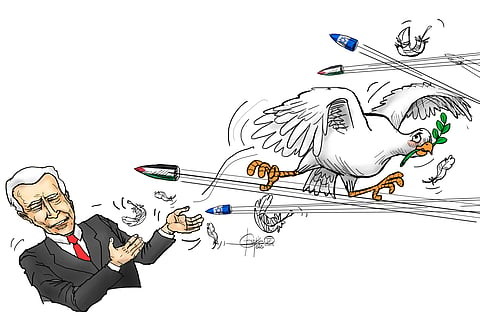
- NEWS
- the EDIT
- COMMENTARY
- BUSINESS
- LIFE
- SHOW
- ACTION
- GLOBAL GOALS
- SNAPS
- DYARYO TIRADA
- MORE

The ongoing conflict in Gaza has entered a critical juncture as mediators from Qatar, Egypt, and the United States have urged Israel and Hamas to finalize a truce deal. This proposal, largely shaped by United States President Joe Biden, suggests a roadmap toward a permanent ceasefire.
However, the realities on the ground and the political undercurrents threaten to derail these efforts. It is imperative to pursue peace based on justice and an end to civilian casualties while remaining vigilant about the potential political motivations behind such proposals.
The truce plan outlined by President Biden offers a structured path toward ending the hostilities that have ravaged Gaza and Israel. The three-stage proposal begins with a six-week complete ceasefire, during which Israeli forces would withdraw from populated areas in Gaza.
This phase also includes the release of some hostages by Hamas in exchange for Palestinian prisoners held in Israeli jails. Following this, both sides would negotiate for a lasting ceasefire, with the truce remaining in effect as long as talks continue. The final phase envisions years of internationally backed reconstruction of Gaza.
On the surface, Biden’s plan represents a balanced approach that addresses both humanitarian concerns and security issues. The proposal has been received with cautious optimism from various quarters.
Hamas, while insisting on a permanent ceasefire and full Israeli withdrawal, has shown a willingness to consider the plan. Meanwhile, key regional players such as Qatar, Egypt, and Jordan have voiced their support, viewing this as a viable pathway to peace.
But Israeli Prime Minister Benjamin Netanyahu’s response to the proposal underscores the complexities inherent in achieving peace. Netanyahu insists that any ceasefire must be contingent upon the destruction of Hamas’ military and governing capabilities, the release of all hostages, and ensuring that Gaza no longer poses a threat to Israel.
This rigid stance reflects significant domestic political pressure, as Netanyahu navigates a fragile coalition government and an increasingly polarized society.
Netanyahu’s insistence on unconditional terms for a ceasefire has garnered support from his far-right coalition partners, but also criticism from opposition leaders and the international community.
This internal dynamic is further complicated by the resurgent anti-government movement within Israel, which has seen renewed protests demanding a resolution to the conflict and the safe return of hostages. The pressure from these diverse domestic factions complicates Netanyahu’s ability to fully embrace Biden’s truce proposal.
Amid this effort, the humanitarian toll of the Gaza conflict cannot be overstated. Since the outbreak of hostilities in October, thousands of lives have been lost, the majority of whom are civilians. The besieged population of Gaza has faced relentless bombardment, leading to widespread displacement and suffering.
The international community has expressed grave concerns about the escalating humanitarian crisis, with the United Nations and various aid organizations calling for an immediate cessation of hostilities to allow for the delivery of much-needed aid.
The situation in Rafah, a city in southern Gaza, exemplifies the dire conditions. Israeli forces have intensified their offensive in the area, causing further displacement and exacerbating the humanitarian plight. The closure of the Rafah crossing, a crucial exit point and conduit for aid, has severely hampered relief efforts, leaving the population in a precarious state.
As President Biden advocates for a ceasefire, it is crucial to acknowledge the political context within which these efforts are unfolding. With a presidential election on the horizon, Biden faces significant domestic pressure to demonstrate leadership and resolve in international conflicts.
His administration’s support for Israel, coupled with the strategic imperative to stabilize the region, influenced the truce proposal. Critics argue that Biden’s push for peace may be partially driven by electoral considerations, seeking to placate both pro-Israel constituents and progressive voices demanding an end to civilian casualties.
While political motivations are an inherent aspect of any leader’s actions, it is essential that the pursuit of peace in Gaza be guided by principles of justice and humanitarianism. The focus must remain on alleviating the suffering of civilians, ensuring their safety, and laying the groundwork for a durable and just peace.
Both Israel and Hamas must commit to the principles outlined in the truce proposal, with the understanding that peace and security for one side cannot come at the expense of the other. Still, while Biden’s truce plan presents a potential pathway to peace, the pursuit of such a goal must transcend political expediency, his bid for reelection.
